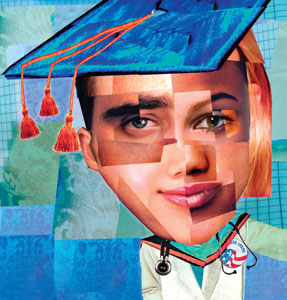Survey Seeks Key to African-American Nurses’ Success
 When it comes to nursing education, African Americans tend to aim for more advanced degrees, yet their percentage among all U.S. nurses is far lower than it is in the general U.S. population. Phyllis Sharps, PhD, RN, FAAN, intends to find out what is behind that disconnect as a key step toward correcting it.
When it comes to nursing education, African Americans tend to aim for more advanced degrees, yet their percentage among all U.S. nurses is far lower than it is in the general U.S. population. Phyllis Sharps, PhD, RN, FAAN, intends to find out what is behind that disconnect as a key step toward correcting it.
Sharps, associate dean for Community and Global Programs, director of the Center for Global Nursing, and the principal investigator for a $20,000 grant from the National Black Nurses Association (NBNA), will use the funding to conduct a national survey to identify the drivers and barriers to success among African-American nursing students and nurses. Through research funded by the new grant, “Enhancing the Diversity of the Nursing Profession: Assessing the Mentoring Needs of African American Nursing Students,” Sharps hopes to determine what mentoring needs are essential to keeping African-American nursing students on track in their education and their career paths.
While African-Americans are underrepresented in the profession (5.5 percent of U.S. nurses vs. 13.1 percent of the U.S. population), the 2008 National Sample Survey of Registered Nurses (NSSRN) shows that African Americans as well as other minority groups in nursing are more likely to pursue baccalaureate and higher degrees—52.5 percent pursue degrees beyond the associate level, while only 48.4 percent of their white counterparts seek equal degrees.
“As nurses, we all know what we needed while attending nursing school,” says Reverend Dr. Deidre Walton, NBNA President. “We need to have a better understanding of what this generation of nursing students needs in this new technological and innovative world of nursing.”